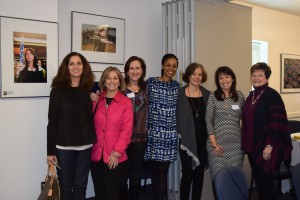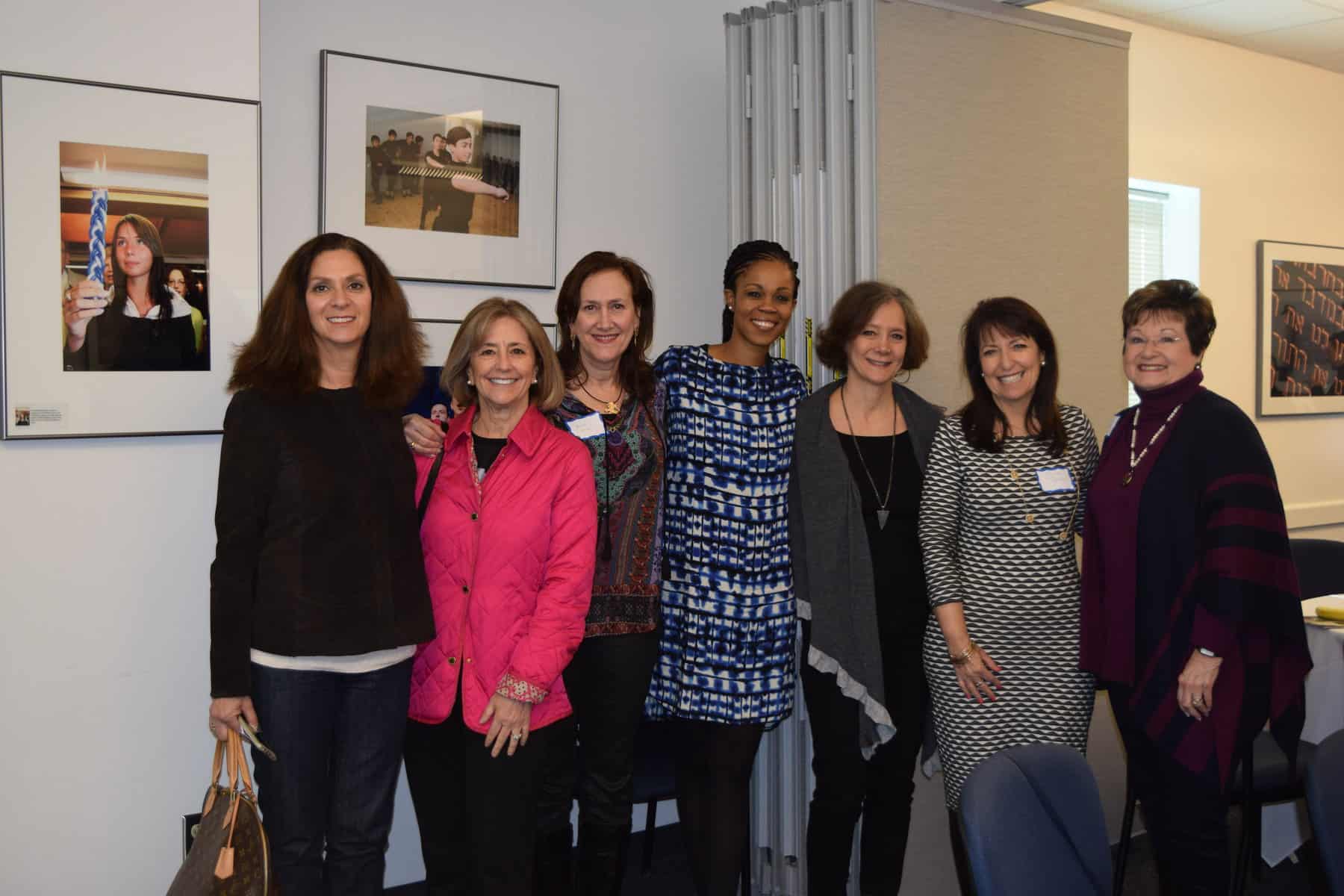 February brought the Jewish women of Tidewater together to hear from two different, but equally fascinating emissaries.
February brought the Jewish women of Tidewater together to hear from two different, but equally fascinating emissaries.
The Women’s Cabinet Outreach and Engagement Committee welcomed Zoya Schvartzman to its second in a series of three “PLUS ONE” events on Wednesday, Feb. 17. Held at the home of Kim Fink, a member of the Cabinet, the group heard about the current work of the American Jewish Join Distribution Committee in Central and Eastern Europe.
So many of the messages on television and websites paint a picture of doom and gloom for Jews across Europe. “Not so,” says Schvartzman. “While it’s true that the Jews of France are feeling particularly vulnerable, and with good reason,” she says, “The Jews of Poland and Hungary and other former Soviet Bloc nations, are experiencing a resurgence of cultural pride.”
Strangely enough, the renewed interest in Jewish history, culture, and art is taking place among Jews and non-Jews alike in these countries. This is illustrated by the popularity of such programs as “Jude Fest”—a Jewish Cultural Festival held each year in Budapest (there is also one in Krakow).
In speaking of the Jewish communities of Europe, Schvartzman hearkens back to her own childhood. Growing up in the former Soviet Union, the daughter of a single mom, the granddaughter of Holocaust survivors, Schvartzman’s family struggled to make ends meet. While she and her family did not practice Judaism (they were not permitted under the Communist government), she always knew they were Jewish. Part of why she knew it was the stereotypical lives they led. Jews in Russia were musicians and artists and scholars. They worked harder than the non-Jews around them, and pushed their children to stand-out and excel, in direct contradiction to the collective nature of Communism.
When Schvartzman and her mother moved from Russia to Canada, they “met” for the very first time a Jewish community. This community saw to their needs —helping them in ways they had never thought possible—with financial assistance, JCC summer camp scholarships, and other basic services. Living in Canada they realized the power of a benevolent Jewish community—one that helped “strangers” for no reason other than that they were Jews and needed help.
Today, Schvartzman “pays it forward” each and every day through her work at the American Jewish Joint Distribution Committee (JDC). In her professional capacity, Schvartzman strives to build spirited communal life in the post-Communist era, from alternative Jewish cafés in Budapest to Jewish youth clubs in Warsaw. She speaks to American communities to tell the stories of where their campaign dollars go to work—building Jewish lives, Jewish leaders, and a Jewish future in countries where Jews were nearly wiped out—by the Holocaust and then Communism. “Challenges abound,” Schvartzman affirms. “There are right wing nationalist members of European governments who spout anti-Semitic rhetoric. And the world is watching thousands of Arab immigrants arrive in Europe each month. But Jewish life remains. Jewish young people are curious and seeking a connection to their Jewish heritage.”
JDC is putting programs in place to encourage and assist those who wish to rekindle their Jewish flame. JDC does this on behalf of the Jewish Federations (like Tidewater) that support them through the allocation of funds from their Annual Campaigns.
Along life’s journey from receiving assistance to providing it, Schvartzman’s experiences have instilled in her the belief that “Every act of kindness has a ripple effect.” And those ripples can be seen and felt and experienced around the Jewish world.
Moving south along the 20th longitudinal parallel—as far as possible before hitting the Indian Ocean—one will find himself just east of Capetown, South Africa. Speaker Olga Meshoe made the journey from South Africa to Tidewater for the third in the three-part series of Women’s Cabinet PLUS ONE events. On Sunday, Feb. 28, at the Sandler Family Campus, Meshoe addressed a group of inquiring minds on the subject of countering the anti-Israel BDS (Boycott—Divest —Sanctions) movement.
A Black African Christian, Meshoe brought a unique perspective with her as she described her own background— growing up in the shadow of the Apartheid movement, with memories of her parents’ struggle to make a change. Meshoe is the daughter of a well-known and influential Pastor, Rev. Kenneth Raselabe Joseph Meshoe, founder of the African Christian Democratic Party. Her parents were dedicated to the struggle against Apartheid in South Africa. It is understandable that they were shocked and outraged to see the BDS movement show up in Africa and begin referring to Israel as an Aparteid State.
Meshoe explains that to Black Africans who struggled against the scourge of Apartheid, calling Israel an Apartheid State is like a kick to the gut. “As a Christian,” Meshoe says, “Of course I love Israel. It’s not a perfect country,” she admits, “But what country is perfect?” Putting the democratic government of Israel alongside Apartheid South Africa is a travesty. “We know what real Apartheid is,” she emphasizes. “Our parents lived through it, fought against it, and have the mental and physical scars to show for it.”
Inspired by the faith, hope, and strength of her parents, and believing that tomorrow can and will be better than today, Meshoe remains hopeful, optimistic, and determined to make it so. With that determination, she set out to create an organization to fight the BDS movement (whose roots are deeply embedded in African soil). Her organization, Defend, Embrace, Invest, Support Israel, a.k.a. DEISI (pronounced Daisy) is diametrically opposed to BDS, and Meshoe’s aim is to show South Africans (particularly young South Africans) why BDS is no friend to them.
Among the questions that DEISI asks young BDS “supporters” to answer are: How does the BDS movement benefit you or Africa? “If you don’t know it,” she tells those young people, “the BDS movement is using you as a puppet! They entice you to a rally, give you a free t-shirt and encourage you to yell and scream and chant slogans which are entirely false!
“By contrast,” she continues, “The nation of Israel is the Start Up Nation of the world. Israel can bring the entrepreneurial spirit and techniques to Africa and help Africans start their own small businesses and grow them. This can help reduce what is now an outrageously high level of unemployment.
“By contrast, Israel can bring its water technology to some of Africa’s poorest and most drought-prone nations, enabling those countries to grow crops where none could grow before and virtually eliminating future famines. “By contrast, Israel—through its medical research—may soon be able to bring to Africa cures for diseases like HIV-Aides.
“Will the BDS Movement improve your lives?” she asks these young people. “Open your eyes and your minds,” she encourages them. “Ask questions and don’t just accept the answers you receive. Google research,” she suggests. Dig deeper. And I am certain that you will find for yourselves that the answers you received were misleading and shallow. The truth is buried further down, and once you find it, you will not be able to support BDS.”
DEISI is taking young South African Christians to Israel in small groups to experience the land and the people. The groups travel throughout the country with their main responsibility to talk to people. They are tasked with asking questions. “Ask the Jews, the Druze, the Palestinians, the Bedoins,” Meshoe tells her young participants. “Ask them how they feel about the government and about how they are treated. And when you get your answers, ask more questions.” Her message to the young South Africans was essentially to dig as far below the surface as they could, knowing that at the bottom, they would never find Apartheid.
DEISI wants to partner with a variety of orga n i z at ions. Currently they are mainly African organizations and Israeli organizations, but Meshoe has not ruled out partnering with American, European, or other organizations. The group discussed the kinds of BDS that some of their children are dealing with on college campuses, including a sort of “brain washing” by anti-Israel professors, who mold the opinions of many unwitting students. The suggestion was also made to try a sort of Birthright program for the young people that Meshoe is targeting. Still in its early stages, the program has had an incredibly positive impact on the young people who have participated.
Meshoe states unequivocally that since BDS was “born” in South Africa, so too must it meet its ultimate demise. She is making it her life’s work to see that her goal is reached.
by Amy Zelenka, Women’s Campaign director

